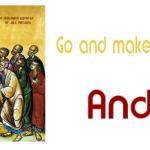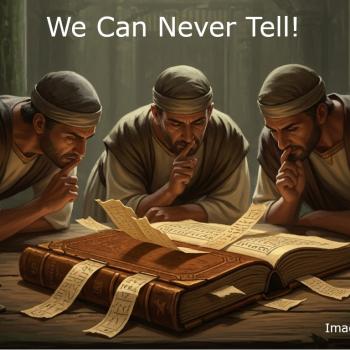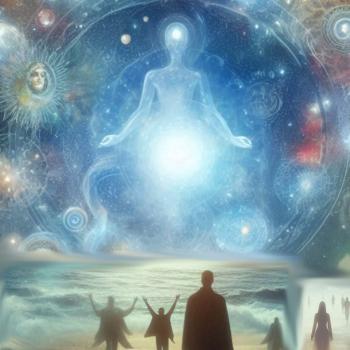We value knowledge. But knowledge isn’t superior to the voice of God. Knowledge is just fact, not compelling spiritual wisdom that moves us in the right direction.
Many have the assumption that the Bible is the literal word of God. We love to simplify our lives with such understandings. But God can speak to us through anything if we listen with a pure heart. The only Bible the apostles of Jesus knew was the Torah, which is the first five books of the Hebrew Bible (Christian Old Testament), and the books of the prophets. The New Testament didn’t exist.

Only one Bible passage speaks to the value of scripture:
“… always learning and never able to come to the knowledge of the truth.
“… continue in the things you have learned and become convinced of, knowing from whom you have learned them… All Scripture is inspired by God and profitable for teaching, for reproof, for correction, for training in righteousness; so that the man of God may be adequate, equipped for every good work.” [2 Timothy 3]
Even the Hebrew Bible was not official (canonized, or an official list of books) at the time of Jesus. The Pharisees and later Masoretes completed copying the Masoretic group of texts between the seventh and tenth centuries AD. Masoretic text. This is the version commonly used in the Hebrew and Christian Bibles.
The Christian New Testament quotes books that didn’t make it into the official list. Some Christian groups certify versions of the Bible that others don’t, in an effort to have the “official” word of God, because God forbid we should have to question anything.
When the last apostle, John, died, there was no Christian Bible. There were collections of sayings of Jesus that circulated among enclaves of believers who commonly gathered in people’s homes. Letters were written by the apostles and others to various enclaves of believers. A few physical buildings for the church (assembly) are believed to have existed, but there is scarce evidence of them.
Jesus and metaphor
According to Polycarp, the Apostle John, most likely 30 years after Jesus’ death, brought together other apostles to record what they knew of Jesus, his works, and his sayings. It’s quite possible that this compilation merged different recollections, resulting in sayings differing from earlier works of Jesus’ sayings found in the Synoptic Gospels of Matthew, Mark, and Luke.
The Book of John uses a lot of metaphor, so it has to be interpreted from that point of view, and not literally.
Example of John about Jesus in metaphor:
“In the beginning was the Word, and the Word was with God, and the Word was God. He was in the beginning with God. All things came into being through Him, and apart from Him nothing came into being that has come into being. In Him was life, and the life was the Light of men. The Light shines in the darkness, and the darkness did not comprehend it.”
Another use of metaphor:
“Jesus said to him, “I am the way, and the truth, and the life; no one comes to the Father but through Me.” [John 4: 16]
Truth is in these, but they aren’t literal. For example, early followers of Jesus understood he showed them “The Way” to live. So Jesus says he is the way, meaning he shows us the way to live. He is also the truth, that is, he shows us truth, which is love. He is the life. Living the way he showed us brings us life. And in another passage, he says abundant life.
Similarly, the Jews knew the first five books of the Bible as a guide to living, with 613 commandments and the foundation of Jewish law. Jesus emphasized the way of love.
The Good News preached by Jesus removed the necessity of sacrifice and of gaining forgiveness through a priest. We are to ask God directly for forgiveness. God wants mercy, not sacrifice [Hosea 6:6 and Matthew 9:13]. Jesus also ushered in the spiritual Kingdom of God, which is for all those who follow the way of living showed to us by God [Micah 6:8].
Jesus’ followers were called “Followers of the Way” of living that Jesus showed us. [Acts 9:2, Acts 19:9, 23, Acts 22:4, Acts 24:14]. This way of living through love leads people to the eternal spiritual Kingdom of God that is now and forever. The Kingdom of God is open to all who follow this way of living. Rather than law, which is open to endless interpretation, love is the standard of behavior that is acceptable to God. God is love [1 John 4:7-21].
Polycarp was John’s student. John later appointed him to be a bishop. Others who wrote at the time, such as Irenaeus, knew Polycarp, and their writings provide a direct historical link to Jesus through John.
What apostles didn’t know
They didn’t make it up as they went along. They reasoned together, and some had dreams which brought consternation and debate about things that were questionable.
An example is the Apostle Paul’s dream about whether non-Jews should follow Jewish dietary customs. He spoke with the other apostles about his dream and they decided imposing such things on non-Jews was too much.
Imposing the Jewish Law on non-Jews was also debated. As a result, non-Jews were not subjected to the 613 laws found in Judaism. There is no legal standard of conduct for non-Jews except love. As much as some might point to laws in the Hebrew Bible that they want people to live by, that’s not apostolic.
The Apostle Paul strained over things like covering your hair. He railed about it, then decided that people didn’t have to cover their hair during worship. He felt a profound sense of consternation about it, which he revealed in 1 Corinthians 11:4–5a.
Paul had similar qualms about sexual practices he saw in the Roman world. They were an affront to him. Loose sexual morals were a concern to most of the apostles. They felt sleeping around corrupted the individual. The body is the Temple of the Holy Spirit. Yet Jewish Law about such things didn’t really apply, even if there was truth in them. We know today that indiscriminate sexual behavior (promiscuity) is associated with at risk people who get into all kinds of trouble.
The apostles firmly believed that Jesus would physically return in their lifetime. Didn’t happen, except for a few. They even recommended to some that they not get married because Jesus was coming back to establish the kingdom of God.
Jesus spoke of his return, likely in metaphor. The Church is the body of Christ on earth. The Church was not fully established during the time of the apostles.
After the year 300, the Bible as we know it today began to take shape. Eusebius was a church historian who examined many documents in existence in his time. He created a list that is like today’s lists of books thought to be valid. He had access to the Theological Library of Caesarea, which had over 30,000 volumes in it collection. Historians believe that the Saracens destroyed it in 638.
The Roman Emperor, Constantine, whose mother was a Christian, decided there was too much mayhem in the empire over religion. Around 300 AD, Constantine, the Roman Emperor whose mother was a Christian, established Christianity as the official religion of the empire. He directed the bishops to meet and create an official list of books to be in the Christian canon we call the Bible today.
Long after Constantine’s death, the official list of books was finally affirmed in 382. Other books were accepted or rejected through another fifty years of history, and their validity is still questioned today. Major Christian branches don’t agree on the official canon.
Heresies
As well as writings he thought were valid, Eusebius also commented on “heresies.”
Gnosticism was a favorite target of heresies. Like I’ve written before, “Gnostics, like ancient Greek secret religions, believed that salvation came from enlightenment by secret knowledge. The idea of secret knowledge seemed opposed to Jesus’ teachings about individual transformation to cease wrongdoing and do positive things. Church leaders ruled out Gnosticism.”
Did Jesus make everything known? Wellllllll. Religion seems to develop in knowledge over time. At the time of Jesus, Judaism had no official doctrine of heaven, hell, or immortality. Ashes to ashes for mortals. Jesus had to talk about those things that crept in from other religions like Greek mythology and Zoroastrianism in Persia.
Today we have Near-Death Experiences, which are subjective but scientifically investigated to show there are consistent attributes for different types. We learn more about immortality from them. But they also support Jesus’ main message, love. They only support the idea of secret knowledge in that they are things hidden from us. But secret knowledge isn’t the key to spiritual growth.
Is there value in believing the gnostic idea that man is a spark from God that is trapped in the material world, which is evil? God created the world. Does God create evil? In a more profound sense, is the world about knowledge or experience? Knowing or doing? Knowing or love?
Am I a better Christian because I know more about the history and interpretation of Christianity than some? That’s knowledge. No, definitely not. It’s the doers of the word [James 1:22-25]. Not that we’re to judge, but I see others who do considerably more than I do.
So there might be some secret knowledge that piques interest, but it has little value in being a follower of Jesus. The Cathars in France fell victim to this thinking and believed reproduction continued the cycle, so they shouldn’t have children. It’s a misdirection.
The letter of Jude mentions books not canonized
Jude and James were half-brothers of Jesus. They were active in church leadership in Jerusalem. Jude may also have been Jude the apostle.
Jude talks about two things that the Bible has little to say about: angels and Enoch.
Jude criticizes others for reviling “angelic majesties.” Disbelief in angels evidently was a thing, just as it is today. He also quotes from the book of Enoch, which isn’t in the canon of Hebrew or Christian Bible books. Enoch allegedly was the great-grandfather of Noah. But scholars believe that the books of Enoch were composed after 300 BCE at the earliest.
Why did the church fathers who authenticated the Bible include books that quote other books that aren’t considered valid? Doesn’t this invalidate the whole? Or did they just not know?
The Hebrew Bible quotes roughly twenty books that are not part of the official book list. The New Testament quotes approximately 14 books or letters that are not officially approved. Plus, there are several books only accepted by some (apocryphal). Non-canonical books quoted in the Bible.
Conclusion
The apostles knew things we didn’t know. They didn’t know things we know. It took them a while to figure things out over their lifetimes so that what they spoke was consistent with God’s love. To fully understand, we should compare the earlier statements of the apostles with their later statements. We take a lifetime as well.
I like the United Church of Christ statement: God is still speaking. It took nearly 350 years for early leaders to sort out books that are consistent in message. The Bible is always beneficial to read. But God will speak to us in a manner of God’s choosing.
Probability Space
What probability spaces can we open in our minds to understand where we might see or hear God’s message to us?
Potential Space
If you think creatively and allow your mind to wander and explore, did God write us a love letter in the Bible, and what message were the ancients trying to tell us?
_________________________________
My friend, David Ketcherside, former Christian broadcaster, has written a book series that I gave feedback on. It’s for men, written from his experience, thoughtful analysis, and heart. Gen A, Z, and X (Millennials) would find it very helpful. It’s available in print, on Kindle, and as an audiobook on Audible. Check out The Whole Dude. His description: “My hope is to remind readers what being whole looks like, and help them recognize the distortions that stop us from feeling totally awesome all the time.” He’s also excellent at marketing if you have marketing needs.
________________________
– Dorian
Our answer is God. God’s answer is us. Together we make the world better.
Restore and recreate. Take time to celebrate life. Laugh, sing, and dance regularly, even every day. Happy. This is why we dance to celebrate life: Reindeer actually running and dancing.
Civic service opportunities
Do Unto Others Kindness Campaign, and civic engagement.
United Methodist Church Volunteer Opportunities.
Join or support Zero Hour and amplify the voices of youth organizing for climate action.
Peoples Hub. Resistance, Resilience, Restoration, Re-imagination. Online Popular Education. For movement workers to learn, connect, collaborate, and strategize – in and across the disability justice and solidarity economy movements.
Stakeholder Capitalism – a video podcast series from the World Economic Forum. Can capitalism be made to work for all of us – and to improve rather than destroy the state of the planet?
General service and aid opportunities (on One Spirit Resources Website). To add your service opportunity to the One Spirit Resources list, contact the author (me) through Facebook Messenger. Note that I only friend people I know.
————————————–
Education Opportunities for new generations
Becoming an Entrepreneur – MITx online
Evaluating Social Programs – MITx online
_______________________
Bible scripture verses are New American Standard Version (NASB), unless noted.
_______________________
Author and books
Appease the Volcano: What does God require from people? The voices of the ancients from many religions echo much of the same things: It starts with law, then mercy and forgiveness, then love. Love is a major emphasis in all major religions and replaces law.
The Prophetic Pattern: Ancient and Modern Prophecy: How to distinguish the intent of various types of prophecies and oracles, both ancient and modern.
Preparing For the Future Of Work and Education: Analysis of the kinds of jobs that AI and Robotics will displace, and the educational requirements for them. AI will replace or augment thirty percent of jobs. This is an in-depth analysis citing many authoritative sources.
Author Website: Dorian Scott Cole













